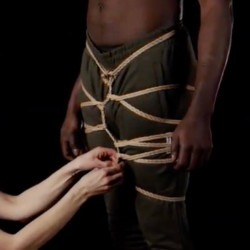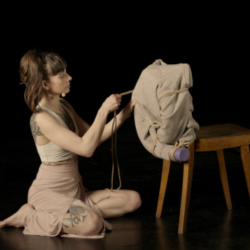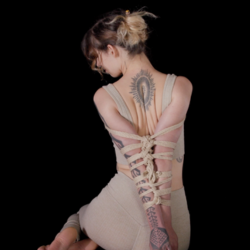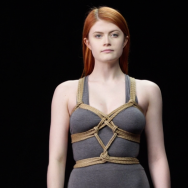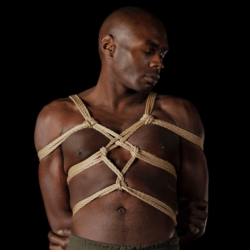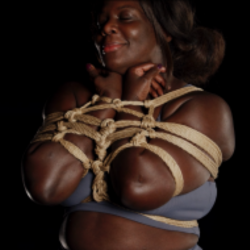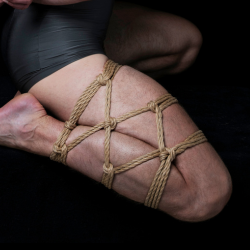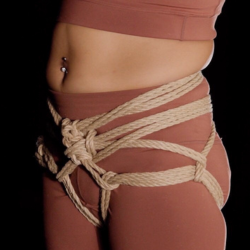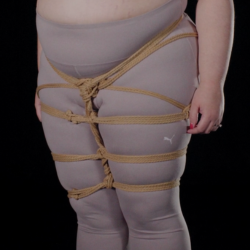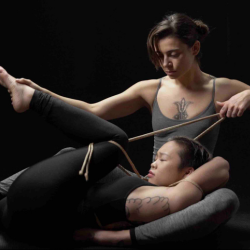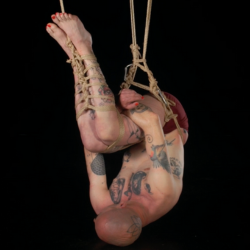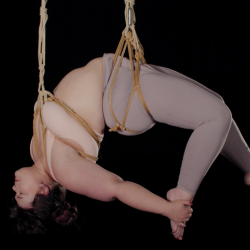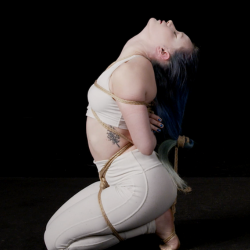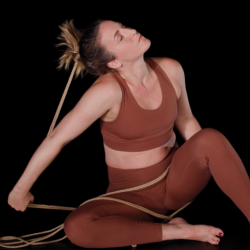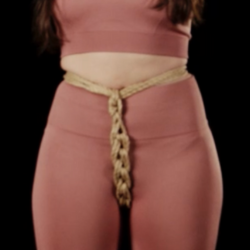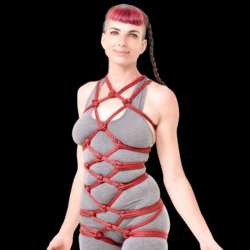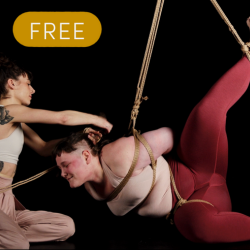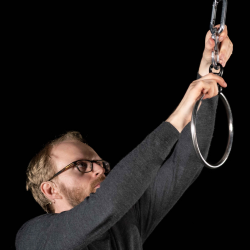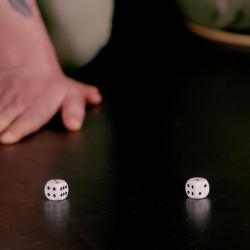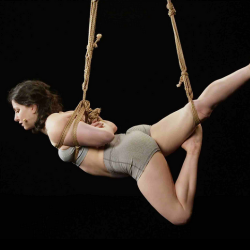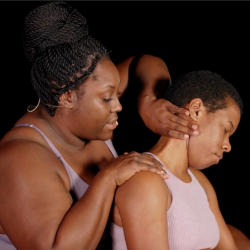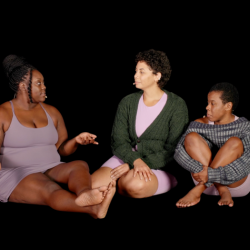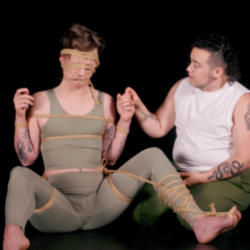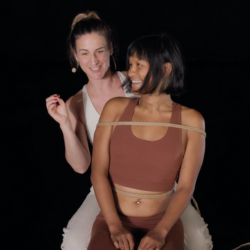EP 21
ECCHIMOZ
In this episode, Émile, also known as Ecchimoz, a rope enthusiast and self-proclaimed "monster," opens up about his journey in the world of shibari.

Émile, also known as Ecchimoz, is a 27-year old non-binary rope rope switch based in Montreal. He has a Bachelor's degree in literature and a Master's in organizational communication. He offers private sessions as a rope top for the curious ones of all genders and also teaches free beginner rope lessons for queer people.
Wicked Wren [00:00:24] Hello everyone and welcome to the Shibari Study podcast today. I have on Émile. Émile uses he/him pronouns. He's in Montreal, he's a rope switch and you are a self-proclaimed big nerd.
Émile [00:00:40] Just a tiny bit.
Wicked Wren [00:00:42] Just a tiny bit?
Émile [00:00:42] All of my free time goes into studying. So much that I'm kind of doing this thing we call a Cheminements Honor, which is you are doing a bachelor's at the same time as a master's. Yeah, I'm kind of doing that because I couldn't have enough of studying.
Wicked Wren [00:01:02] So it's like you got the bachelor's degree and then went on to do the master's, but then threw on another bachelor's in there.
Émile [00:01:10] A bit more... Yeah, exactly. I did the first bachelor's in literature. I didn't know what to do, and I was like, I like this. I did it. It didn't lead me nowhere and no money or anything. So I was like, okay. And I turned myself to human communication and organizational communication. And during the program, it wasn't going fast enough and my GPA was high. So I asked if I could do the master's at the same time, and I got accepted.
Wicked Wren [00:01:42] Wow. I didn't even know that was an option.
Émile [00:01:44] Yeah, me neither.
Wicked Wren [00:01:46] So with literature, did you have fun with that degree at least?
Émile [00:01:50] It helped me understand the rules and expectations of university. That's pretty much it.
Wicked Wren [00:01:56] That makes sense.
Émile [00:01:57] And it made me learn about myself a lot.
Wicked Wren [00:02:01] I have a lot of questions about your master's, but when did you get into the rope scene, or how did you get into it?
Émile [00:02:10] It was in 2016. I was in a Japanese class outside of university and I met this girl and she's named Sami and she was the owner of Tension. And she introduced me and a bunch of very complicated stuff happened and I started rope again two years later. I was basically in a monogamous relationship, cheated. It's not a time I'm very proud of. Let's say.
Wicked Wren [00:02:47] Definitely. And you're a rope switch, right?
Émile [00:02:51] Yeah. When I started again, it was more as a bottom because I didn't have money, really, to pursue class and the way I learn is mostly from watching and watching and watching. And from getting tied. I know like, what good tension is and what's not good tension. And yeah, I learned a lot from just being like – it's part of my language. I don't know how to explain it but... It's the way I think. It's the way I move through the world. It's like it's... To me, it's all connected.
Wicked Wren [00:03:28] Being a rope bottom and knowing what tension feels good and things like that makes you a good rope top. I feel like it's really, really necessary.
Émile [00:03:35] It really, like, set the table for when I started learning rope I was like, "Oh okay, it just makes sense now".
Wicked Wren [00:03:41] You have a really unique style. You just posted this picture tying in overalls. I love that picture.
Émile [00:03:49] Thank you. I felt like I needed to be gay.
Wicked Wren [00:03:54] And what better way to do that but overalls?
Émile [00:03:58] Right? It was so warm, but I was like, maaan... let's do it anyways.
Wicked Wren [00:04:03] Yeah. So when you were learning rope, did you do – you said that you learn how to do it from watching other people doing, kind of dissecting it. Did you take classes and things as well, or was it only through watching?
Émile [00:04:16] So I met my girlfriend 2016. We did ropes. I fell in love, but I was monogamous. I quit rope, came back to my monogamous relationship and for two years rope and my girlfriend, it wouldn't -- it would just not leave my mind. So two years after I was like, okay, I'm ready. I'm ready to be trans. I'm ready to like be non-monogamous in a healthy way and a consensual way. And I'm ready to start rope again. So it's 2018 and she's the owner of Tension, and it's complicated because I was so young and she was an owner, you know, she was in a power position and she was like, "I want to tie you, but I, I can't really because of my position" and I was like, "I met you outside of the community. I don't give a damn. I don't give a damn." And she was still careful and everything. And it was also because she had multiple breaches of consent that happened before. So when I came back, she was like, "I know I need to change and I need to do things differently. So we're going to take time." And I didn't have a lot of time to get to be close to her because there was callouts, public callouts. And at that time, I left everything behind me, everything that I've known to be in this community and in this new world. And I couldn't just accept. I was like, "I'm a feminist. If I don't side with the victims, then, you know, I'm not a real feminist." It was like three months after I came back in the rope community. So I was like, "Oh my God, I left everything behind for like, my mentor is kind of like gone. My girlfriend too. My friend too." And I... I stopped gradually doing rope because of the cancellation. Because it was such a weird position to be in to take sides and I wished we handled it in a different way. I really wished. And I was too hurt to be in that community. And during COVID I had a lot of time to be alone and think about the whole thing, and I was wondering "What can we do so that it never happens again?" like, what can I do so that it never happens again? And I decided to join my new bachelor's. That's how I got into the field of organizational communication. Because I needed answers.
Wicked Wren [00:07:41] My next question is, obviously, have you learned anything from that? Do you think that there is a way? I have a ton of thoughts about accountability and the [00:07:52]word community, [0.8s] and I think [00:07:54]the word community [0.2s] kind of gaslights us a little bit. I would love to hear your thoughts on this.
Émile [00:08:01] I have so much thoughts. Like so much thoughts. I think it's why I'm doing – I think it's why I have such a high GPA. It's because I can relate it to the cancellation and how it's been handled and how I just relate everything to that.
Wicked Wren [00:08:21] Yeah.
Émile [00:08:22] So I'm like kind of grateful that it happened because I would have never reflected on those subjects, like, ever.
Wicked Wren [00:08:30] Yeah, it's a petri dish of just like...
Émile [00:08:34] So I'm like, "Oh, it sucks, but thank you, I guess." And... Where to start. I'm going to talk about the first thing I realized of like, "How can I change this" and the first answer was, and it still is, through me. In terms of like, I cannot change others, but if I change the way I react in this culture, the things I accept and the things that I don't, if I... If I have like a conduct code? Kind of? I can be more accountable to myself and others. And I think that it will help.
Wicked Wren [00:09:25] Yeah.
Émile [00:09:27] So I came back to my girlfriend Sami in 20.... 21? Its been two years. Yeah. And I was like, "I want to heal. Let's heal together." And she was like, "Erm... Okay, fine." And then that's it.
Wicked Wren [00:09:50] What did that look like? What did healing look like?
Émile [00:09:57] Being honest about what I want, what I don't want, and to actually talk about the things that hurt.
Wicked Wren [00:10:05] It's hard because cancellations don't work. People... Once they're canceled, they're not just going to leave. It's hard because there's no structures in place. That's why I hate the [00:10:15]word community, [0.1s] because the community implies that there's a social contract and that there's rules and that there's things that we do and we don't do. And everyone has their own moral compass. And it's impossible to govern that as a whole.
Émile [00:10:30] It is.
Wicked Wren [00:10:30] I really like what you said about it starts with you. So going back to the beginning, it sounds like you got out of a monogamous relationship, transitioned, and got into the (…) world at the same time. That's a lot to do at the same time. And I think a lot of trans people do that.
Émile [00:10:47] Hmm hm. Well, it's kind of like all connected.
Wicked Wren [00:10:52] Yeah. Agreed.
Émile [00:10:53] It was like, all or nothing. If I'm changing, I'm changing everything.
Wicked Wren [00:10:57] Yeah, well, it is funny because it's nonconventional relationship formats. You're going against the gender binary and all of those people kind of gravitate towards (…) in a way.
Émile [00:11:11] Maybe it's a hot take, but it's like once you get it -- it's like bingo, you get it once and... I don't know, you have a full card! I don't know!
Wicked Wren [00:11:22] There's a bunch of free squares on the card.
Émile [00:11:24] Yeah.
Wicked Wren [00:11:24] There's a bunch of jokes here, to be made. But there's a bunch of free squares, they just kind of come along with it. What are some other things from your studies that have impacted your view of the (…) world or the rope world?
Émile [00:11:39] It's really made me think about power dynamics, um, from like individually top, bottom but also like how the community... Sami at the beginning was very rigid about the way she taught me things. Um, I remember at some point she was teaching me how to do an Agura, and I said, could you add a [00:12:03]crutchy [0.0s] in the agura? And she was like, No. And I said, Why? Yeah, why, why? What is this? Is this just power? Just because you can? And I was very like, I don't know how to say that, but not bratty. It's not bratty. It's just...
Wicked Wren [00:12:21] Yeah, it's just trying to push against the power structures in place to, like, see what the walls are. That make sense.
Émile [00:12:31] Just like --
Wicked Wren [00:12:31] What happened?
Émile [00:12:35] She started doing an agura with the [00:12:37]crutchy [0.0s] and the whole time she was like proving me that it wouldn't work.
Wicked Wren [00:12:43] Yeah.
Émile [00:12:46] So we were kind of like fighting for power in that moment, but it did work. And it changed at that moment. It changed completely our relationship.
Wicked Wren [00:12:57] Yeah.
Émile [00:12:58] Now, for real, it's so more equal just from that being like, "No. I can add my part too", and it's like "You're going to let me see for myself what is working and not." And it also showed her that she is wrong sometimes and that maybe it's fun to do a [00:13:21]crutchy [0.0s] in an agura, and maybe there's so much more that you never explored.
Wicked Wren [00:13:24] Yeah. How is it being in a relationship with someone that you're also in a rope dynamic with?
Émile [00:13:30] We don't tie much, for real. We live together, so we don't really tie anymore. We could. I mean, we have the place here, but. I don't know. I feel like this... It's supposed... When I started rope, it was like the forbidden thing to do. That's why I liked it. It was that "I'm not supposed to do this." But now that I can, and with someone I love, it was like getting out of the routine.
Wicked Wren [00:14:06] What are you like in rope as a top?
Émile [00:14:09] I'm still discovering myself a lot, but recently I tied someone and... I describe myself as... I objectify people a lot. I don't know why I do that. It's just. I don't know. They look good in my ropes. It's just... I can't stop looking at them. So much that they become objects kind of.
Wicked Wren [00:14:40] I love that.
Émile [00:14:41] Objects of my desire, you know?
Wicked Wren [00:14:42] Yeah.
Émile [00:14:43] And. So objectifying and intrusive. I'm a very intrusive person. I like to get into people's bubble. Like yes, you are an object, but you're mine. So being intrusive is like kind of like playing with my doll.
Wicked Wren [00:15:11] What are some ways that that happens?
Émile [00:15:14] I have this way of... I have the person that I'm tying here. I'm a very visual person. Sorry for people who are listening. I have someone in the middle --.
Wicked Wren [00:15:25] He's making a circle with his hands.
Émile [00:15:27] Okay, so – That's the person. The rope is here. And then I'm trying to like, I could grab the rope, pass, like – I could go grab the rope, walk, walk there, like crouch there. But I can also just go through with the person and, like, just put a hand on their crotch while I'm grabbing the rope and "Oops, it's just... You just happened to be there. Like, sorry, I need to do this thing and you're here and I'm going to make you feel like you are here."
Wicked Wren [00:16:01] Have you always been like that as a top, or was that a progression?
Émile [00:16:07] I used to avoid being a top because I was scared that I'm like five foot tall. So I was very scared of not being... impress – top-py enough. Like not being able to make people feel some type of way. It was just stupid. When I think about it, I'm like, "Oh, I don't need to be tall or strong or... Like I can play mind games."
Wicked Wren [00:16:39] Yeah.
Émile [00:16:41] And that's –
Wicked Wren [00:16:42] Way worse.
Émile [00:16:42] That's more power. For real. Yeah, like I can use my brain.
Wicked Wren [00:16:47] Was there a progression? I'm sure many people feel this, is why I'm asking. Was there a progression? Was there something specific that you thought about and started doing? Was there something that got you out of your comfort zone and pushed you there?
Émile [00:17:04] Me.
Wicked Wren [00:17:04] I love it. Love it.
Émile [00:17:06] I was like, I am like this. I don't like this. I need to change. So I'm going to do the thing that makes me feel super uncomfortable. I'm going to keep doing it until it feels right. That's amazing.
Wicked Wren [00:17:17] That's amazing.
Émile [00:17:19] Like there is no other way than to just do it.
Wicked Wren [00:17:23] Do you have – go on, sorry. You were saying, you just have to do it. And that's very true. He's got to (…) do it.
Émile [00:17:32] Mm-hmm. And I had good friends to push me to, to not give up. Very good friends.
Wicked Wren [00:17:37] That's huge. This is really really big. You said mind games. And it has piqued my curiosity. I have to ask, do you have any favorite mind games that you like to do in rope?
Émile [00:17:51] I think so. I feel like inside of me there's like, a monster and I want to, like, let it out. And I want people to feel that I'm letting it out and that it feels dangerous. And my mind game is like you trying to figure out if it's safe or not. When I was saying intrusive, it's that I like when there is no barrier and, or frontier between me and the bottom. And there were kind of like just one.
Wicked Wren [00:18:28] Yeah.
Émile [00:18:29] And that scary part is the mind game is... Yes, figuring out if I'm going to lose control or not, but I'm kind of like figuring out at the same time as them. It's their reaction that makes me lash out or not? Or like explore this side, or it's my bottom that gives me the permission to go there.
Wicked Wren [00:18:58] It sounds like you're very intuitive and you're very big on listening to what the bottom's doing.
Émile [00:19:04] Mm-hmm.
Wicked Wren [00:19:05] And reading what the bottom is doing.
Émile [00:19:08] I'm kind of like almost a spirit when I tie and I'm like completely... Even though I'm – I objectify and the bottom is clearly at the center of my attention. It's. And my desire. It's ah... I'm not there. I'm kind of like, I'm not here. I don't... I don't exist in that moment. And it's, it's so weird, I guess just for them.
Wicked Wren [00:19:51] It's amazing. I feel like that's why you're able to have these connections where it sounds like you're putting ego to the side and you're just doing what is there in fun. So I do have a question. And the photos you take are awesome. I love them. It sounds like you were also very intentional and connected in your sessions, so I want to know how the camera comes out in a session and what role the camera has and what role social media has.
Émile [00:20:23] Mm-hmm. I'm not posting often so... And I'm not tying often these days. The camera doesn't play (…). For me, the camera kind of ruins my presence. And I take pictures because I just like it and I love to edit. And I know that people love to be seen. So. I'm still in service to my... Maybe I'm just a service top, but.
Wicked Wren [00:20:54] I don't think you're a service dog. There's a whole bit about a monster inside. I don't think you're a service tog.
Émile [00:21:01] I can't. I can't. See? I'm still learning who I am.
Wicked Wren [00:21:03] Yeah. Earlier, you said something about there's a monster inside and you feel like you need to get that out, and I love that. Have you always felt that way before you found rope and all those things?
Émile [00:21:18] I always felt like there was something wrong with me. I'm laughing but it's not funny. I knew I was different. And maybe it's just. It might be deep, not deep and vulnerable to say this.
Wicked Wren [00:21:38] Mm-hmm.
Émile [00:21:38] Yeah. I feel like there's a monster inside of me. And if I show it to people, they will leave. Like I have this belief. And when I do rope, I'm playing with that. And that's why I don't play often with people. Because it's so... I need trust.
Wicked Wren [00:21:59] I think that the style of rope that you do where it's very objectifying, it's super scary because you're putting people in positions that you want to see, things that you think are hot. And that's terrifying. It's easy when you just search that stuff online and you can look at it in a dark room and then you close it. That's easy. But when you're doing it and then also posting on social media, you're essentially telling the world like, "Hey, I like this thing", and that's super (…) scary.
Émile [00:22:31] There was this one time I tied Sami and I would, like, take my ropes and hit her with it, just like floggers. And she got so, so, so, so scared of me. Like, I was in a space where, I don't know, it was, I can't describe. It's like the world collapsed for a few... I can't remember. A few minutes? Seconds? I don't know. But the way she looked at me. Truly felt like she saw me. I was like, "Oh, my God, I... I'm not... I did not invent this. I'm truly a monster. I see it through her eyes and it feels good. It feels really good."
Wicked Wren [00:23:18] That's terrifying.
Émile [00:23:20] It's very confronting.
Wicked Wren [00:23:22] It's terrifying to hear as a bottom. I mean, you're like, Oh, wow.
Émile [00:23:31] It's like, I wish every tie was like this. It's so not but, this is what I want. I think it's ideal.
Wicked Wren [00:23:41] Yeah, it's hard to make every tie like that. Earlier, I was going to ask you, what are some things that you do to try to set the space up to do those things? But I didn't ask it because it's so difficult to even personify what goes into making that emotional space, physical space, etc., etc., etc..
Émile [00:24:03] I feel it's a lot of "As you go". I start to tie, I have no expectation. I have no positions in mind. I have nothing in mind. Literally nothing. And I start with a single-column somewhere. And I hope that the rope will lead me. It's true. It's the rope. It's not me.
Wicked Wren [00:24:30] That's amazing.
Émile [00:24:31] And it depends of how, where the bottom is leading me. It never comes from me. It's when I see that they are opening up to me that I can push more and more and more. I never impose it. And that's, that's how it's set. It's not me. It's, it's never me.
Wicked Wren [00:24:58] Have you always been like this from the beginning? When you knew nothing, when you didn't know a TK, couldn't do patterns quote-unquote. Had you always just kind of been like, "I want to have fun, I'm going to put some rope on you, I'm going to tie you up, and it's not going to be quote-unquote, shibari or whatever." Or was there a progression to unlearn things? Like patterns and sequences.
Émile [00:25:27] I feel like the progression was – it did not happen in rope, but outside of rope where I talk about what I'm going through with my friends and that they give me the permission to be.
Wicked Wren [00:25:42] Yeah.
Émile [00:25:43] And that's why I – I'm a very social person, even though I'm introverted. But I learned a lot from my friends and how they are and the conversations we have and what they tell me. And when they gave me permission, when they were like, It's okay if you feel that. I'm like, Oh okay, I can keep going and the trust we built. That's the progression. It's me accepting that I'm (…), I'm a monster, and that it's okay.
Wicked Wren [00:26:19] Yes, it is okay.
Émile [00:26:20] That's it.
Wicked Wren [00:26:20] And it's encouraged, and we need it. And we want it.
Émile [00:26:26] Yeah, seeing my bottom being like, "I liked this session. I hope we can keep on doing exactly this and push it."
Wicked Wren [00:26:35] Yeah.
Émile [00:26:36] Mm-hmm.
Wicked Wren [00:26:38] So, what is coming up for you? You have anything fun coming up that you want to tell us about? Or maybe where people can connect with you and follow your work and stuff like that?
Émile [00:26:49] Hmm. I told one of my good friends that I might want to connect again with people on the broader Montreal community. And maybe do a project where I go take photos of people's dynamic and I kind of like – not interview them, but I do something that's called "Emile reçoit". "Emile reçoit" is "Emile hosting". It's a very bad name, but when my friends are playing, I do this thing where I listen to the scene and I observe what people might be going through. And after the scene I reflect like, "Is this how you felt? I saw this and it made me feel this way." And we explore like what really happened during the tie. And I want to do that with people that I wish I had the opportunity to do before the cancellation, you know, before we... We stopped trusting each other?
Wicked Wren [00:27:58] Yeah.
Émile [00:27:59] So I want to connect again. Even if it's uncomfortable. I love being uncomfortable.
Wicked Wren [00:28:05] Being uncomfortable is so important. It's the most important thing. That's like my M.O. is I try to be uncomfortable all the time. I try to do stuff that I'm not good at.
Émile [00:28:16] But it's, it feels good after. Like, I feel, I do uncomfortable stuff when I'm like "It's what I needed to do in order to be me."
Wicked Wren [00:28:28] Yeah and grow. That's how you keep doing stuff and growing. So Émile, I want to thank you so much for being on the podcast. You're amazing. So many great nuggets. Do you want to tell people where they can find you?
Émile [00:28:40] Um, they can find me on Instagram under Ecchimoz, but it's written. Like " ecchi moz " ? It's... They'll find me there.
Wicked Wren [00:28:53] I've always been curious about how that's said. I'll be honest.
Émile [00:28:58] It's from the word Ecchymose, which is bruise in French. And then I just change it to the word ecchi in Japanese, it means pervert. And then Moz to... It's just... It's prettier to, to read.
Wicked Wren [00:29:14] That's amazing. I'm happy that I got that. If anything, we all learned the origin of the name. Well, thank you so much. And I'll talk to you soon.
Émile [00:29:24] Thank you.
Start your free 7-day trial
Get one free week of unlimited access at Shibari Study,
then pay from $17.90/month. Cancel anytime.


